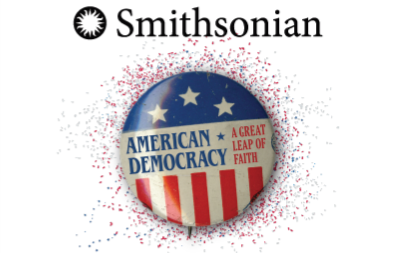
GREENSBORO, NC (November 26, 2019) – The Greensboro History Museum is launching Project Democracy 20/20, a major initiative exploring the history of American democracy and its best tool, the vote. The initiative’s centerpiece, the Smithsonian traveling exhibition American Democracy: A Great Leap of Faith, will be on view at the museum December 7, 2019–March 29, 2020.
“Using our vote, we tinker, invent, mend and adjust, attempting to build a nation that supports the ideals of democracy,” says Museum Director Carol Ghiorsi Hart. “With so many important events and anniversaries in 2020, from the Census and presidential election to the 150th anniversary of the Fifteenth Amendment, the 100th anniversary of women’s right to vote and the 60th anniversary of the Greensboro Sit-ins, it is a critical time to examine questions all generations of Americans have faced: Who are ‘We the People’? How do we participate? What keeps democracy’s promise alive for us?”
Project Democracy 20/20 will transform much of the museum’s exhibit space. The permanent galleries will highlight Voices & Visions of Democracy, and The Gerrymandering VR Game, an interactive virtual realtiy experience developed for the project, will help visitors learn about connections between technology and electoral districts. Project Democracy 20/20 also includes free public programs, educational activities and innovative community connections. But the star of the initiative through March is the Smithsonian traveling exhibition.
American Democracy: A Great Leap of Faith was developed by the National Museum of American History and adapted for travel by the Smithsonian Institution Traveling Exhibition Service. The Greensboro History Museum, a Smithsonian Affiliate, is its only stop in the Southeast.
The exhibition explores the challenges and triumphs that generations of Americans encountered as they sought to create a government based on the sovereignty of the people. It explores the history of citizen participation, debate and compromise from the nation’s formation to today. Featuring artifacts from the Smithsonian and many other organizations, American Democracy demonstrates that self-government relies on every citizen’s active participation in the quest to form a “more perfect union.” Exhibition sections explore the origins of American democracy, the changing identity of eligible voters, the machinery of democracy, the right to petition and protest beyond the ballot and the rights and responsibilities of citizens.
The first section sets the scene with “The Great Leap,” which examines the system that the colonists inherited and the issues that founding generation debated to change that world.
The second section, “A Vote, A Voice,” looks at Americans grappling with the expansion and contraction of voting rights as they debated who should have a direct voice in the political process.
In its third section, “The Machinery of Democracy,” the exhibition investigates the informal institutions and activities not spelled out in the Constitution but which make America’s participatory system possible and motivate citizens to join political parties, support candidates and vote.
“Beyond the Ballot” explores the ways in which Americans have shaped their country through petitioning, protest and lobbying throughout the country’s history and across the political spectrum.
“Creating Citizens,” the concluding section, examines basic questions: How diverse should the citizenry be? Is there a need to share a common national story? And what are the rights and responsibilities of citizens? These questions have shaped the most contested debates in America’s more than 200-year-old political history.
The Smithsonian Institution Traveling Exhibition Service (SITES) has been sharing the wealth of Smithsonian collections and research programs with millions of people outside Washington, D.C., for more than 65 years. SITES connects Americans to their shared cultural heritage through a wide range of exhibitions about art, science, and history, which are shown wherever people live, work and play. For exhibition description and tour schedules, visit http://sites.si.edu.
Smithsonian Affiliations is a national outreach program that develops long-term collaborative partnerships with museums, educational, and cultural organizations to enrich communities with Smithsonian resources. More information is available at www.affiliations.si.edu.
Project Democracy 20/20 is made possible in part by funding from the North Carolina Humanities Council, a statewide nonprofit and affiliate of the National Endowment for the Humanities. North Carolina Humanities Council supports through grants and public programs vital conversations that nurture the cultures and heritage of North Carolina. Learn more about the work of the North Carolina Humanities Council at www.nchumanities.org.
Other major sponsors for Project Democracy 20/20 include Wells Fargo, CrossComm, Fox Rothschild LLP and the O.Henry Hotel.
The Greensboro History Museum – an AAM-accredited Smithsonian Affiliate – shares the city’s compelling history through diverse collections, engaging exhibits, educational programs and community dialogue. Located in Downtown Greensboro’s Cultural District, the museum is open Tuesday–Saturday 10 am–5 pm and Sunday 2–5 pm. Admission is free. Learn more at www.greensborohistory.org.
# # #







